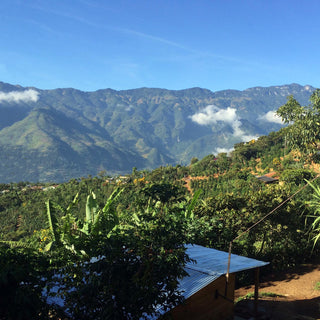- Filter
Lilac Dream
BLACK TEA | PEACH | FLORAL
Lilac Dream is one of our most delicate coffees. It has a tea-like texture, stone fruit sweetness, underlying florals and orange juiciness. These will mostly be washed coffees from East Africa, but expect a few surprises from other countries that offer this flavour profile.
The coffee in Lilac Dream right now comes from one of my favourite producers from El Cedral, Honduras. You can read more about him below.
Adding product to your cart




FROM MUSHROOMS IN CALIFORNIA TO SOME OF HONDURAS’ BEST COFFEES
Wilmer is one of my favourite people in the coffee world. His humble, hardworking, and high precision approach to coffee inspires me every time I see him. Wilmer started with a commodity coffee farm in El Cedral that had a mix of coffee varieties from old growth Bourbon to low quality Lempira (Catimor variant from Honduras). Now, that farm has been 100% replanted with bourbon and Pacas, both varieties that yield an excellent cup. He also has a second farm, also in El Cedral, where he planted Pacas in 2015 and Geisha in 2017 - from Panama seeds, I brought him (see more below). His newest farm is in Los Andes, and there he has planted Geisha and Pacas. All three of his farms are kept in impeccable condition and lovingly maintained by Wilmer himself.
What I love most about Wilmer is that he values and appreciates the impact that switching from commodity to specialty coffee has had on his livelihood. Although he has endured some hard years, he is aware that his efforts in producing high quality coffee have resulted in a net positive effect for his family and have resulted in him owning more producing farmland. Although it seems obvious, this nuance is not grasped by all coffee producers. In recent years, we have been paying Wilmer more and more for his coffee and it gives me great joy to see the positive impact this has had on his family. He is so deserving of his successes.
This particular lot of coffee is from a single daylot from a farm called Los Andes. This farm is one of three small farms Wilmer owns and it’s the one closest to his house. Until recently, the farm had aging Pacas and Catimor and cupped fairly average. In 2020, Wilmer replanted it with Geisha and the trees look beautiful. He also planted a lot of shade, but those trees will take a few more years to fully grow. Los Andes is a beautiful undulating farm nestled inside a natural land formation that protects it from winds from all sides.
Here’s more history on Wilmer and how we started working together. In 2006, Wilmer decided to test the quality of his farm and submitted a small lot into the Honduras Cup of Excellence. To his surprise and pleasure, his entry placed 25th, proving his coffee is special and has potential. A year later Wilmer had an opportunity to work in the US and spent the next five years working as a foreman on a mushroom farm in California. Although the income was enticing, he decided to return to Honduras and resume his life as a coffee producer. This time, though, he was determined to make his coffee better.
Back in 2012, I met Wilmer and expressed an interest in buying his coffee directly. Prior to that, Wilmer was selling it on the commodity market for much lower prices. Wilmer knew that his farm had potential and was keen to implement projects to realize it. I was really impressed by his determination.
So in 2013, we purchased all of Wilmer’s production. Although the coffee tasted very good in Honduras, it lost a lot of character during transport and tasted more subdued when it arrived in Calgary. We saw this as an opportunity for improvement and in 2014, Wilmer and I worked together to set up parabolic drying beds. We financed the cost of the materials and Wilmer built the beds and the parabolic cover prior to the start of the harvest. We worked with Wilmer to set up drying protocols to slow down the drying process, create more even drying and avoid exposing the green coffee to high temperatures.
In 2015, we took it a step further and worked with Wilmer to add shade to his drying structures. I visited Wilmer many times in the years pre-Covid to ensure that the shaded drying was working as expected. Throughout my visits, I always felt that Wilmer was ready to try his hand at growing more exotic varieties, so in 2016, I was able to smuggle in some Geisha seeds to Honduras and shared them with him. The history of the seeds is intriguing because they come from none other than the Hartmann family in Panama – known for their revered Geisha. Wilmer set up a nursery of Geisha in 2016 and planted them in 2017.
– Sebastian

PAIRS WELL WITH
Good one..
A fruity, acidic light roast that really delivers!
We love your Ethiopian coffees🫶
We loved Lilac Dream in our house, we definitely will be having this in our rotation for coffee!
I have been a customer of Phil And Sebastian since its inception . I have always been able to trust that I will get a product that tastes great . I was given good advice in the cafe on where to find the notes of R3 in the new branding and lilac dream fit perfectly. Well done


